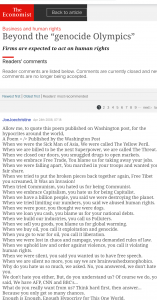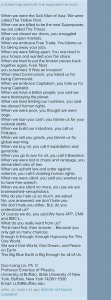几分钟就可以查明的假货,还有人当宝贝。
教授的名字都错了。
http://ascportfolios.org/chinaandmedia/2011/01/23/a-story-of-a-poem-what-do-you-really-want-from-us/
The interesting thing is, SUNY-Buffalo does not have any faculty named 林良多. However, there is a 林多梁 in Physics school. According to Prof. Lin, he found this poem by accident in 2008, then he sent this poem to his friends. Maybe some of his friends misunderstood the origin of the poem and sent it to Washington Post.
党的英文喉舌当年就澄清事实了:
http://www.chinadaily.com.cn/cndy/2011-01/26/content_11917251.htm
When some Chinese media reported this month that a Chinese-American professor in the Untied States had published a poem in the Washington Post on May 18, 2008, complaining of Western prejudice toward China, China's Internet community hailed the verse as "a sharp arrow aimed at the bias of the Western world".
Titled What do you really want from us? the poem begins with parallel assertions aimed at exposing Western hypocrisy:
"When we were the sick man of Asia, we were called the yellow peril. When we are billed as the next superpower, we are called the threat.
"When we were silent, you said you wanted us to have free speech. When we are silent no more, you say we are brainwashed-xenophobes."
Then it asks the question: "Why do you hate us so much?"
However, the alleged author of the poem, Professor Duo-Liang Lin of the University at Buffalo, the State University of New York, denies writing the poem. His only connection, he says, might be that three years ago, when he received the poem in an e-mail, he passed it on to some of his friends.
Lin says he partly agrees with the content of the poem, but he believes the strong sentiment is unhealthy, and hinders China's development.
Netizens have argued the poem "expresses the depression and anger of the overseas Chinese who live under the double standards of foreign countries", but Lin told me he has never experienced depression in more than 50 years in the US and he rejects the anger and "hatred" revealed in the poem.
As ties between China and the West grow stronger, problems have emerged. It's unavoidable. Just as two people can experience quarrels and misunderstandings in a relationship, so can nations. As a rising nation, China is in the spotlight. That's why we need more rational dialogue and communication.
Luqiu Luwei, executive news editor of Hong Kong-based Phoenix Satellite Television, who has written a book on bias in the media - in both the East and the West - says prejudice exists everywhere due to limits of knowledge, information and experience. He says it's necessary to gather as much information as possible before leaping to conclusions.
And it's important to realize your own prejudices can still cloud those conclusions.
How many of those who have criticized the foreign media as deliberately "anti-China" can honestly say they are frequent viewers or readers of CNN, the BBC, the New York Times or the Washington Post?
When they hailed the poem reportedly "published by the Washington Post in January 2011," how many took a minute to log on to the newspaper's website to do a simple search of its archive? And why did the media reporting the "news" fail to call Professor Lin to confirm it?
And when we complain that Western countries don't understand China, to what extent do we really understand them?
One of the most significant causes of bias is a lack of information. If we rely on hearsay, prejudice deepens.
Stability in relations between nations is only possible with the participation of the people. As long as people understand each other, ties between two countries can be strong. President Hu Jintao noted during his visit to the US that a partnership should be based on cooperative efforts to meet challenges and required the extensive involvement of the people.
To reduce prejudice, we need to enhance communication. We must abandon the idea that "foreigners have always bullied us" and stand before the world as a country among equals. We should be more open and explain China to the world.
When we hear criticism, we must ask ourselves first whether it's reasonable, and when we think its wrong, express our opposition in a rational way. Extreme nationalist emotion won't necessarily hurt understanding and mutual trust, but it won't help build relations.
The same applies to Western countries.
A 60-second video, featuring dozens of famous and unknown Chinese is showing from Jan 18 to Feb 14 in New York's Time Square to promote China's image. Experts say China is trying to "talk with the outside world in their context".
With the Internet, people in different countries are already moving closer, increasing their opportunities to travel abroad and to widen their scope of communication. International relations are not the preserve of governments, everyone can be a diplomat. The way you want the world to treat you is the way you should treat the world.
An ideal world may not be the "one world, one dream" of the poem. It might be a world of different dreams that we tolerate and appreciate in their variety, and help to realize through cooperation.
The author is with China Features, Xinhua News Agency.




